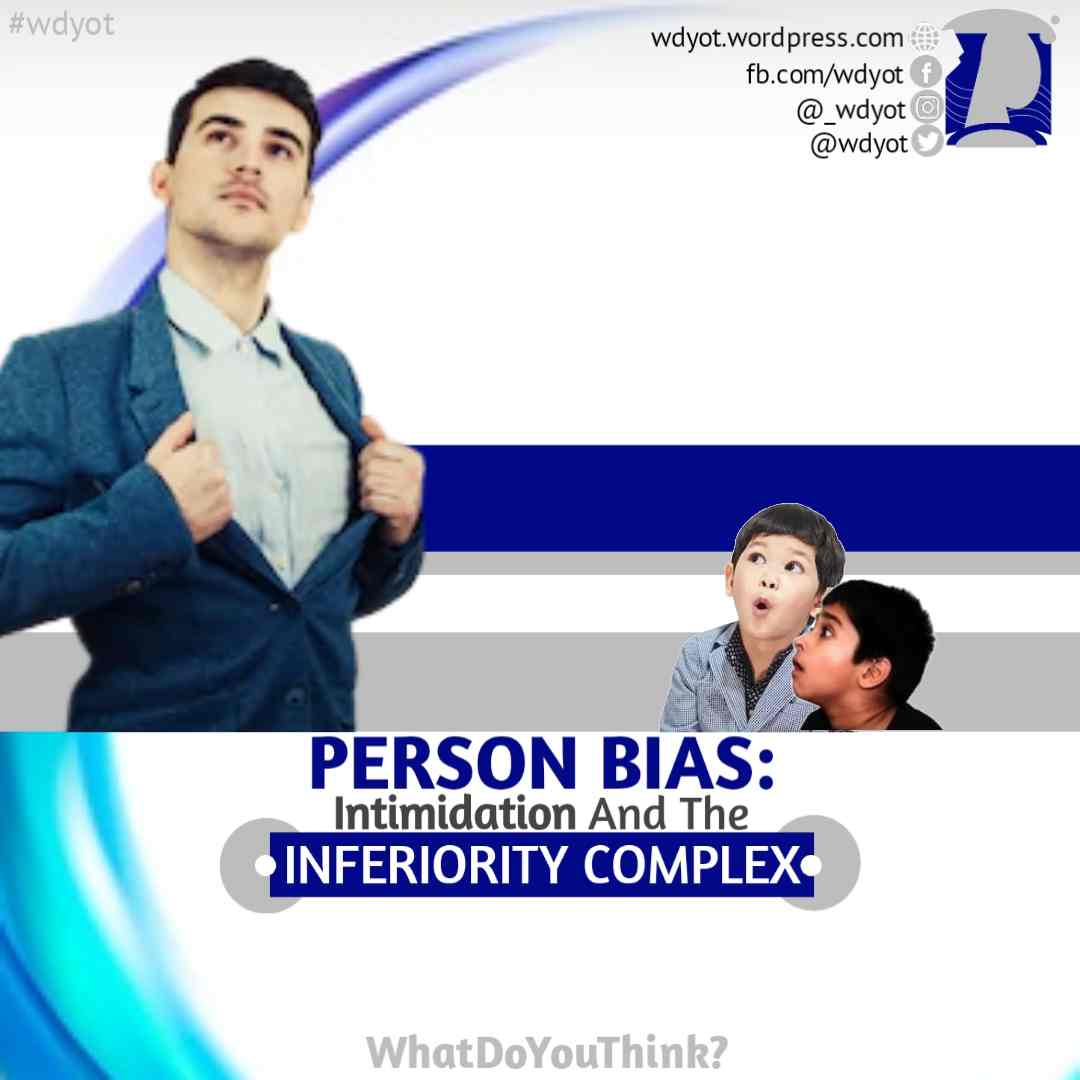Try answering this question for yourself before going through the rest of the article, just within a few seconds to two minutes. It’ll help shape perspective and give a better understanding. What Do You Think?
How many times have you regarded your professor as something of a god? You look to him like he’s the most knowledgeable of men existing, a rare species, endangered maybe, and you just have to revere him as he stands in front of the class dishing out all the stuff there is. Why is that?
INTRODUCTION.
The Person Bias, also known as Fundamental Attribution Error, is our propensity to attribute others’ actions at a particular place and time to their personality characteristics, without considering the peculiarities of the situation. What this suggests is that, whether or not this person would do this or be like this in this particular situation or not do this in that other situation does not matter. As long as he has this or that trait, then he will do this, and that’s absolute.
Now, while people can be predicted based on their characteristics and we can take their traits to predict what their response to situations will be-after all, the whole of existence would be a complete marshmallow if there wasn’t some predictability, some common root to persons and situations– we might sometimes be mistaken, thus committing this fundamental error.
…the whole of existence would be a complete marshmallow if there wasn’t some predictability, some common root to persons and situations…
PERSON BIAS – CASE STUDIES.
CASE STUDY 1.
Take for instance, good old professor that featured in the opening question, and let’s see how the person bias shows up here.
Prof has spent the better part of his life studying that subject he is presenting in class that morning or at the seminar that evening. He has been on it for so long that he practically breathes it. He has an analogy for every concept even remotely connected to that topic to underline and emphasize his mastery of it. At 63, he has been a professor of Zoology(for example), for some thirty-ish years.
Now, here you are in your freshman year studying Zoology, and here’s this demi-god before you spewing all this stuff you don’t think you could ever begin to scratch the surface of. So you form this image of the prof, and he appears to you an omniscient person, exuding confidence in his knowledgeable, elegant striding, fluent speaking off-hand lecturing, the picture of an absolute, impeccable, unfaltering champion.

CASE STUDY 2.
In this first Zoology class, you happened to sit beside a tall, well built colleague. He invites you to basketball practice afterwards. You met him there and couldn’t help but gawk at the accuracy with which he shoots hoops, the speed and agility with which he dashes about the court. You begin to see an impeccable athlete, all-knowledgeable, flawless gait and grace. And you draw your conclusions there too.
Your own flabby arms and awkward movements only serve to underline his own mastery of the sport.

CASE STUDY 3.
Somewhere sitting at the back of the class is Miss Geeky. She has thick glasses on, and she already completed the course material before resumption. That was while you were having your own farewell parties and seeing enough movies that you believed should serve you for months in advance. She remembers every single thing the professor said. Of course, she already knew it all before the prof came in.
On top of that, she has the most beautiful flawless skin you’ve ever seen. And aside that, in between classes, you often see her by herself on the concrete benches, under trees, on her computer, dashing out lines of code. Yourself are not really sure if it’s spelt ‘cold’ or ‘code’ or ‘coad’.
She is to you, the image of cool, calm, quiet, collected efficiency, the quintessential best par excellence student, and she must be that brilliant at every other thing. You could just see her fingers flying on the keyboard of the computer and you already see her at a piano with fingers flying just as efficiently. They’re all keyboards after all, aren’t they?
You look at your own skin with all the residual spots from your childhood chicken pox, and you remember how you had to give up Corel Draw because you couldn’t begin to understand the essence of the whole thing.

PERSON BIAS AND INFERIORITY COMPLEX.
At the closing paragraph of each of the Case Studies is a sort of antithesis, chiefly featuring yourself.
Because you’ve seen those people excellent in those specific areas in which you have observed them, you automatically attribute the same excellence to them in all other effects. You know, you might have noticed that, at first impression, people you perceive as better looking, more beautiful/handsome than others, are those people that strike you as smarter and more knowledgeable.
Because of these impressions you get, as per the Case Studies now, you then begin to feel like less of a person in this world of experts. Everywhere you turn, there’s an expert on something, and you can’t seem to find anything about yourself that stands out. You feel yourself becoming less, less and less till you’re too low to look anyone straight in the eyes. Even in those areas where you think you might be something, once someone makes a mention of anything related to that field, you automatically give them the mantle of authority.
And the Inferiority Complex builds up and permeates every fibre of your being like that.
Everywhere you turn, there’s an expert on something, and you can’t seem to find anything about yourself that stands out. You feel yourself becoming less, less and less till you’re too low to look anyone straight in the eyes.
PERSON BIAS AND REAL LIFE.
But let’s end this story this way. It’s time for a field trip someday, maybe to a zoo somewhere, and the whole class is loaded into a bus. Then suddenly, in the middle of nowhere, the engine coughs, sputters, groans, calling for help, and then dies. Just like that.
Long stretches of trees on either side, and by your observation, you probably don’t expect to see another vehicle coming your way in another hour. No reception either. Everybody’s signal bar is showing red.

Everyone gets out, the driver opens up the engine and tinkles around, then you see him speaking with prof in low hushed tones off to the side. And there you are, you’ve heard that kind of sound before that the engine made before it died, you’ve had a run at an auto shop, or you just know these things, you have a good idea, an aptitude for all things engine.
But hey, there’s prof, he must have seen these kinds of things, he’s an expert anyways.
And hey, there’s muscled basketballer of the year. He should be able to dunk his way through the engine.
Hey, what’re you saying? There’s geeky girl, she could maybe just hook her computer up to the engine and push a few keys on the computer and get things rolling.
And of course, all these other people looking good and confident,well-dressed in immaculately pressed shirts and dripping make-up – they should be able to fix it. What do I know, of all people?
But after a quarter of an hour, peeps were getting irritated and jumpy and the sun was starting to scorch. You see nothing would be done by any of those people, and then feeling like the biggest fool called to defend the group project that he had no part preparing, you step forward to where the prof and driver were conversing, and suggest you might know what to do. And after tinkering about for a little while, you ask the driver to get in and test, and voila, the engine sings your praises as it roars to life.
Three cheers for you, some clap you on the back as they file back into the car, and you begin floating in a rainbow.
A PERSON IS A PERSON.
The fact that someone is better at something than you are doesn’t make them more of a person than you are. When we get down to it, there’s another something you’re better at.
Sometimes, even in the same field with various specializations, this issue can show up. Take writing for example. You look at the works of a romance author, and your own sci-fi suddenly becomes trash, something that’s out of touch with reality. Romance, love, is what people feel, not abstract futuristic scientific concepts. Whereas, unbeknownst to you, the other person is also eyeing your own sci-fi, wishing they had as much imagination and tech savvy.
When we get down to it, there’s another something you’re better at.
A BIT OF PHILOSOPHY: FALLACY OF HASTY GENERALIZATIONS.
The basic point is this: we allow an image that we have formed of someone to traverse the whole of our perception of them. We are prone to this error, what the philosophers call the Fallacy of Hasty Generalizations; attributing the qualities of a part to the whole. Take for example this prototype of a philosophical argument:
Premise 1: Monkeysville is a street in Bush Valley
Premise 2: Monkeysville is a very clean area.
Conclusion: All streets in Bush Valley are clean.
While we can agree that Monkeysville is clean, it doesn’t go to say that all streets in Bush Valley are necessarily clean.
CASE STUDY 4: AN ANTITHESIS.
And of course, this concept also goes the opposite way to inferiority complex.
There was that scrawny awkward kid that came late to class with a load of textbooks under his arms. He rushed in and froze at the door when he saw the class had started, jangling to a halt, and his loads of textbooks and notebooks crashed to the ground.
As he bent to retrieve them, his pen fell out of his breast pocket, and his glasses fell off his nose and cracked too. The whole class was in a raucous. Prof challenged him for interrupting his class, demanding a reason, but he could only gawk and sputter, blinking rapidly, eyes almost useless due to the cracked glass.
He is the silly, inexperienced kid with no idea of how life is to be lived, with speech impediments maybe, and an absolute bore he must be too.
Then you look at your own desk, just one notebook, a pen, a textbook, eyes functioning well without glasses.
And just like that, he came late to one class and was too rushed and tensed up to give real answers, and he’s to you, the image of the all-time loser.
You see somebody gaffe at something once, and you perceive them as complete losers.
“If people are failing, they look inept. If people are succeeding, they look strong and competent. That’s the ‘halo effect.’ Your first impression of a thing sets up your subsequent beliefs. If the company looks inept to you, you may assume everything else they do is inept.“ Daniel Kahneman.
DRAWING IT ALL UP – ABOUT FIRST IMPRESSIONS.
You’ve been paying attention, and it is not very necessary to stress anymore that these all go to underline the point, the line that you’ve always heard for a long time, that “first impressions matter.”
They matter, but they are notoriously not always accurate. If you think about it, isn’t it unfortunate that most employment processes today make selections based on first impressions?
“I don’t know if you’ve ever noticed this, but first impressions are often entirely wrong.” Daniel Handler.
Want to see tonnes of more quotes on first impression, check out AZ QUOTES.

